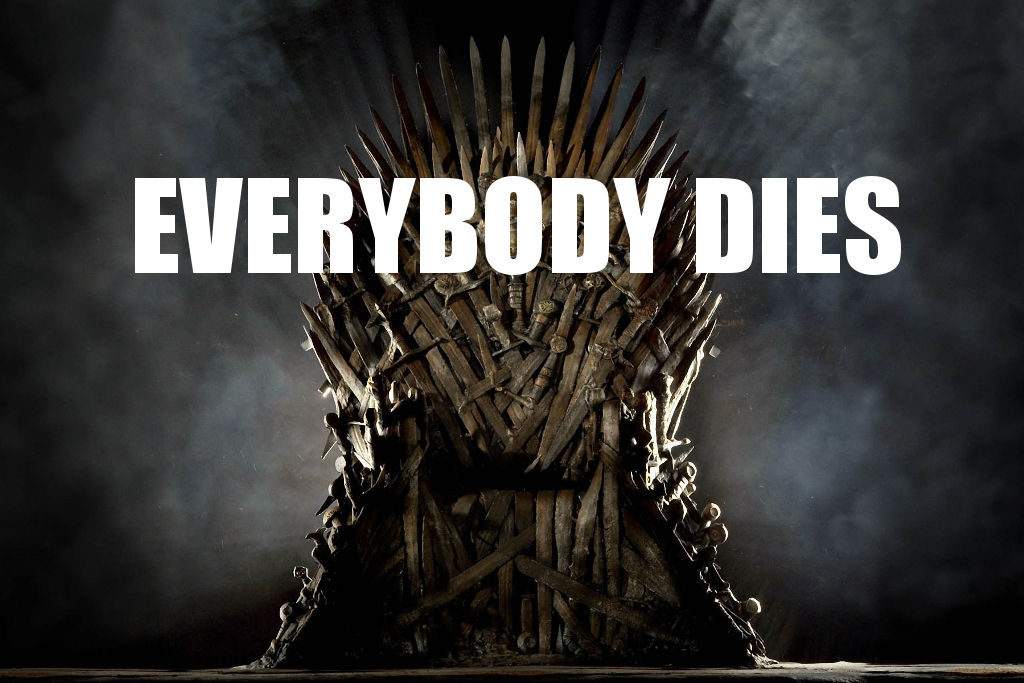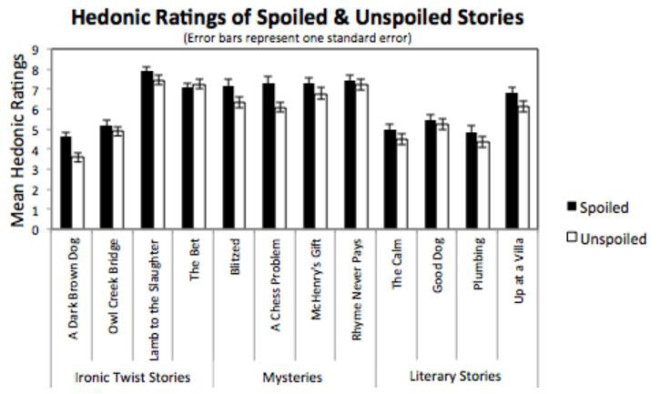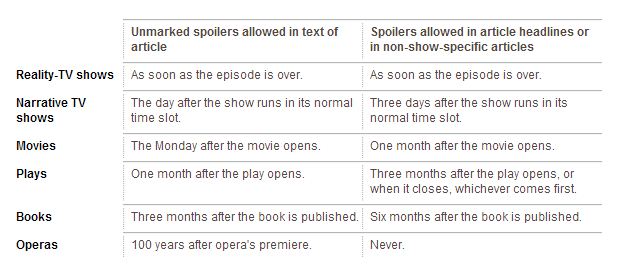What Should We Do About TV Spoilers? And Why Do We Even Care?
Want to become the most hated person ever tonight? All it'll take is a tweet.

Want to become the most hated person ever? All it takes now is a Facebook status, tweet, or a mere few words whispered around the office, relaying a crucial plot point in an unwatched episode of a favourite show.
No other program in recent history has hit the spoiler trigger point more than Game of Thrones. Season four wrapped up today in the States, with the finale due to air this evening in Australia – meaning there’s a few hours left for your day to be completely ruined.
Last month, Mashable tweeted out spoilers to their four million followers just shortly after a GOT episode aired in the USA. Fans of the show were left fuming — and rightly so. “There was no way for me to avoid the spoiler, it was right there smack in the middle of my feed,” wrote Australian tech journalist Adam Turner. “Not even the word SPOILER in the headline.”
At Junkee we try our best to keep our headlines and images vague, and our spoiler warnings prominent. But when we get it wrong, people seem less angry that a spoiler had been revealed than they are at how hard it was to avoid. So what is it about the whole ‘spoiler’ thing that gets us so shirty? How long should we wait before we talk about an episode? And do they really ‘spoil’ the show?
–
How Do You Stop Spoilers?
It goes without saying: spoilers suck. Especially when you live with a strong moral code in Australia, and have to wait hours, days or weeks for the latest episode to make its glacial way to your screen.
People who hear spoilers are like… pic.twitter.com/4K3rBTkicI
— Arya Stark (@SassyArya_) May 19, 2013
Twitter’s introduction of the mute button came as happy news to fans, allowing them to mute a certain user. Tweetdeck allows you to mute hashtags and terms, and apps like Spoiler Shield — which was inspired by fan backlash over ‘Red Wedding’ spoilers — lets you block whole subjects too.
Investing money in technology is one thing, but what if we all just played by the rules? Many have tried to come up with spoiler guidelines for fans and news outlets — and while some of the suggestions are useful, others fall a bit short.
Solution #1: Gizmodo.com
“Here’s the deal for anyone lagging behind the live schedule: You get one week,” writes Sam Biddle, in Gizmodo’s ‘How To Stop Spoilers From Ruining TV For Everybody‘. “People have to respect the fact that you’re going to watch it on your own schedule – but that schedule expires in seven days.”
Also, “if it’s off the air, no mercy”, “yes, do say, ‘spoiler alert'” and “Twitter is off limits” — though you can allude to things vaguely: “Wow, crazy ending on Walking Dead tonight! I almost threw up!” is okay. But “WALTER WHITE JUST DIED ON BREAKING BAD” is not.”
The problem with the solution: A seven-day grace period isn’t a bad idea, but it does seem a bit unfair to two parties: those who are dying to talk about the episode right after it airs, and those who live in countries with outdated ideas about television programming, who are forced to wait longer.
–
Solution #2: Sydney Morning Herald
One of the best (albeit vaguest) rules offered by Fairfax’s Emma Kemp is, “Exercise conversational etiquette: ask the person you’re talking to how much of the show they’ve watched before you launch into your thoughts on episode four.”
Also, avoid key words. Like “purple”. And “red”.
The problem with the solution: Online, it’s difficult to ask everyone if they’re up to date or not. Shouldn’t prefacing a news post with ‘spoiler alert’ and burying the spoiler more than a scroll away be enough? And for recaps, shouldn’t the word itself indicate spoilers are to follow?
–
Solution #3: Vulture.com
In 2008, New York Magazine’s online pop culture offshoot Vulture tried to end the spoiler debate amongst their readers by coming up with ‘The Official Vulture Statutes of Limitations on Pop-Culture Spoilers‘. The spoiler guide features specific rules for narrative TV, reality TV, movies, plays and books. Also, operas!
For narrative shows, they proposed a one day grace period for unmarked spoilers in the text of an article, and three days for spoilers in article headlines.
The problem with the solution: A mere 24-hour wait would make most fans really angry — and what constitutes a “normal time slot”? The time the episode first airs on television, anywhere? What about different time zones in the US, and different release dates across the world? Australian networks are trying hard with the whole fast-track thing, but there’s often still a few hours of lag at least.
Of all the rules and regulations, the need to decide on a common ground is obvious: a universal time limit on spoilers that takes both the serial live watchers and laggers-behind into account.
–
Do Spoilers Really ‘Spoil’?
At this point it’s worth asking what the stakes are. Back in 2011, Wired‘s Jonah Lehrer used the results of a study to argue that spoilers don’t actually ruin anything. UC San Diego academics took a sample group of undergraduates, gave them a variety of short stories from different genres, and dropped spoilers on some students, while others read unspoiled.
In most cases, they found that spoilers made little difference to how much a story was enjoyed. And for some readers, it was actually more enjoyable reading the already ‘spoilt’ short stories.

Although the study is based on literature, you can wrest from it broader conclusions about our spoiler obsession: knowing the ending doesn’t necessarily mean there aren’t surprises along the way. So while you might initially be pissed off knowing that your most hated (or loved) character dies (or lives!) in the next episode of Game of Thrones, you’ll still be interested to find out how it happens.
And surprises aren’t even fun anyway. When you’re hit with a massive plot twist, the study found, you’re less likely to be impressed by it and more likely to feel “the dismay of a prediction error“. If this is the way we respond to new narrative twists, could spoilers in fact be misunderstood?
But there’s no better spokesman on the topic than the author of “five whole volumes consisting solely of spoilers“. George R. R. Martin, author of the series on which Game of Thrones is based, took to his blog to weigh in: “If something happens on the show before it happens in the book, I suppose one could call that a spoiler. If something happens on the show, but happens very differently in the books, is that still a spoiler? If something happens on the show, but never happens in books, what precisely was spoiled?”

Rather than thinking of spoilers as an enemy to be stopped, it might be time to acknowledge their inevitability, and rethink exactly how destructive they are, and how to deal with them. In the meantime, we’ll keep putting the word ‘spoiler’ everywhere we can, in the hopes we catch ’em all.
–
Katie Booth is Junkee’s editorial intern. She tweets at @kboo2344
